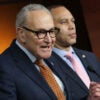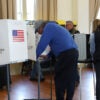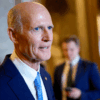In response to OPEC’s inability to come to agreement on boosting oil production, the White House indicated that it would not shy away from tapping into the Strategic Petroleum Reserve (SPR), which holds 700 million barrels of unrefined petroleum reserves in underground salt caverns, in order to smooth over oil supply disruptions originating from the Libyan conflict. A temporary oil price increase, however, is not a valid reason to tap into the U.S. emergency oil supply, which is, after all, a national security asset.
Although President Obama’s approval ratings have been suffering under the heavy burden of high gas prices across the country, national security interests—not politics—should guide the use of America’s SPR. As Heritage policy experts James Carafano and Nick Loris explain:
The SPR, managed by the Department of Energy (DOE), exists for moments of national crisis when there is a dramatic disruption in oil supplies. The current high prices at the pump are a national concern—but playing politics with a national security asset is not the way to address the problem.
A brief review of OPEC’s history further suggests that the lack of agreement among the cartel members is no surprise, nor should it be a major source of concern. Saudi Arabia and its allies are perfectly capable of increasing—and likely will increase—its own oil output in spite of the OPEC disarray, because it is in its interest to avert crushing oil price increases from the Libyan disruption. Reuters market analyst John Kemp even suggests that output will increase beyond what would otherwise have been the case had OPEC been able to reach agreement.
The failed ministerial conference has pushed OPEC to the sidelines and will ensure oil supply decisions are made in Riyadh—unconstrained by the concerns of other cartel members. That probably means a more dovish approach that sees more barrels coming to market because Riyadh is far more concerned about the political and economic damage from soaring oil prices than Iran, Venezuela and some of the other cartel members.
Price hawks like Iran and Venezuela have overplayed their hand. Paradoxically, failure to reach a consensus means output will rise more sharply and openly in the coming months than it would have done otherwise.
Nevertheless, there are important actions that the U.S. should take to stabilize oil prices in the long term. The U.S. could increase access to oil reserves onshore and offshore by (1) speeding up lengthy permitting processes, (2) removing any moratoria that prevent drilling in places like Alaska and most of the outer continental shelf, and (3) increasing the sale of leases to domestic oil reserves. These measures could help offset rising global oil demand while also strengthening America’s strategic position among oil-exporting countries.































4 Replies to “No Reason to Tap the Strategic Petroleum Reserve”